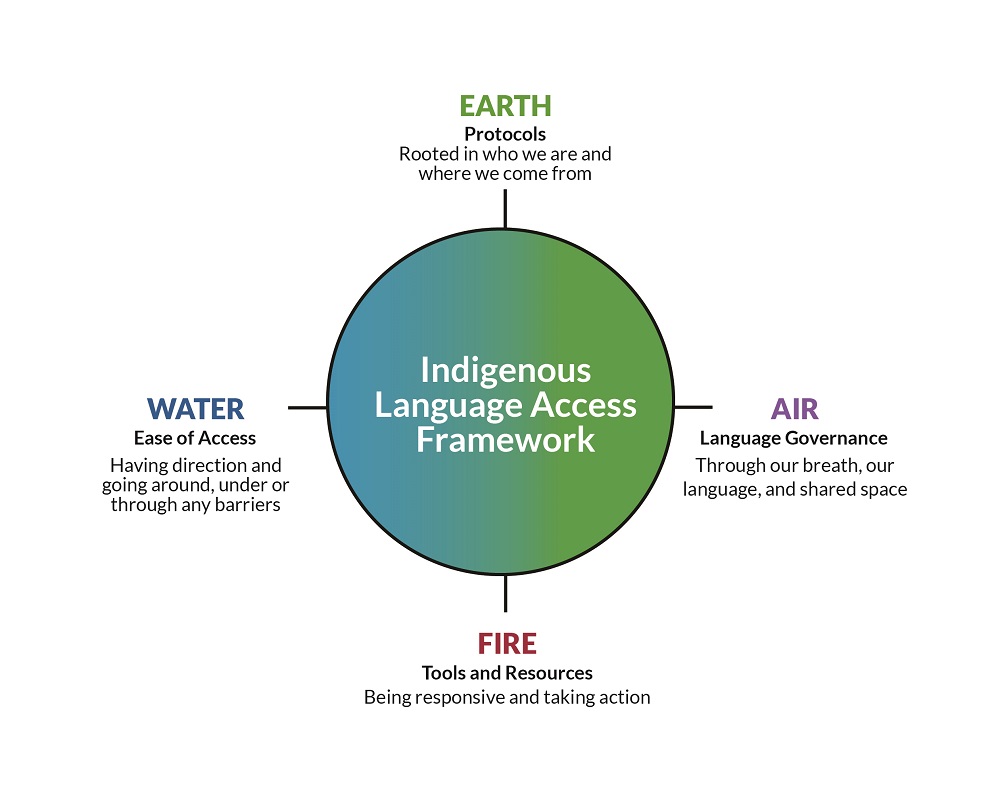Equity & access
Provincial Language Services offers high-quality language access services to health authorities, family practice practitioners, specialist offices, and other allied health professionals.
Services we provide
We are collaborating with Indigenous communities across British Columbia to develop a comprehensive model that improves access to health-care services in Indigenous languages. This initiative, currently in its early stages, focuses on building relationships, listening, and understanding the distinct needs of each community.
The
Indigenous Language Access report (PDF), informed by conversations with First Nations and Indigenous individuals and organizations, provides insights on how this work will be achieved. Based on the findings of this report, we will continue to partner with First Nations communities to co-create an Indigenous-led model for language access that prioritizes Indigenous ways of knowing.
This visual represents the framework on which Indigenous language services will be developed and provided.

Earth
- Indigenous Peoples are unique and diverse, as are their protocols.
- There is an inherent responsibility to ask and follow local protocols to ensure accountability and transparency.
Air
- Language rights of an Indigenous individual are equal to health rights.
- Indigenous language interpreter/translator innovations occur in partnership with Indigenous communities and health-care partners.
Fire
- Resources and tools are created in a coming together of both Indigenous and Western ways of knowing.
- The health-care system mobilizes Indigenous-specific anti-racism and cultural safety education.
- Resources remain rooted in Indigenous perspectives on health and wellness.
Water
- Collaborative processes are in place, including priority areas for implementation, the co-creation of advisory teams, and parity and consistency in service delivery to support ease of access.
- Process on how to access interpreter and/or translator services is clear, user-friendly, step-by-step.
- Communication plan across the health-care system so that every door is the right door to access.
Service benefits
Using an equity-driven approach, Provincial Language Services works to ensure communication between the patient and provider is accessible. All of our services assist in creating equitable access to health care and health information for patients who speak immigrant and refugee languages, official minority language speakers (French in B.C.), and members of the Deaf, Deaf-Blind and Hard of Hearing community.
Services include interpreting (rendering of oral language), translation (rendering of written language), community outreach, health navigation services, and knowledge translation promotion.
Our services optimize the delivery of safe and equitable health care for patients with various cultural and language needs.
At Provincial Language Services, quality assurance is a multi-level process embedded in all aspects of our service delivery. Our processes contribute to a culture of continuous improvement of our services and organization.
Provincial Language Services adheres to strict policies and procedures on professional conduct. Any compliments or complaint/incident regarding Provincial Language Services procedures, staff, contract staff and service providers (interpreter, intervenor, captioner and translator) is documented, investigated and tracked.
To make a compliment or complaint, please contact Provincial Language Services Quality Assurance.
 Email:plsqualityassurance@phsa.ca
Email:plsqualityassurance@phsa.ca
 Video call:& Email
plsqualityassurance@phsa.ca to schedule a video call
Video call:& Email
plsqualityassurance@phsa.ca to schedule a video call
 Fax: 604-297-9304
Fax: 604-297-9304
 Phone: 604-297-8400
Phone: 604-297-8400
 Mail:
Mail:
Provincial Language Services Quality Assurance
1795 Willingdon Avenue
Burnaby, B.C.
V5V 6E3
